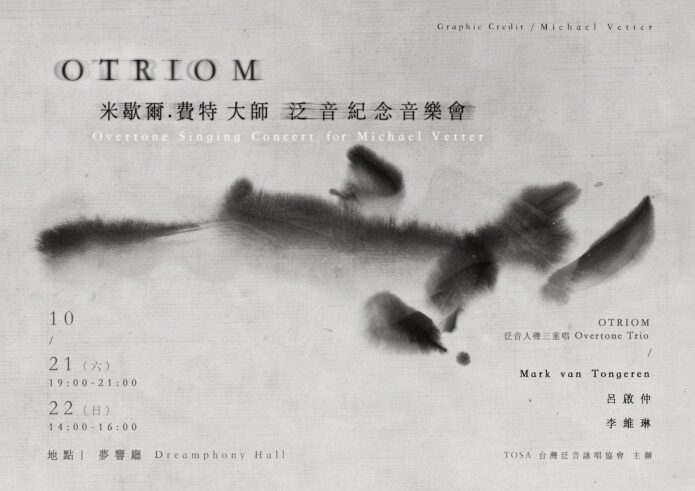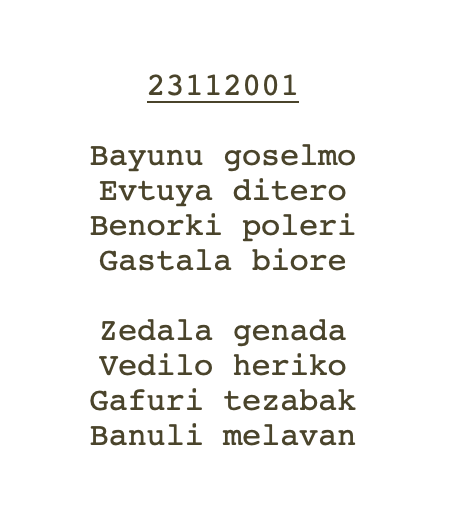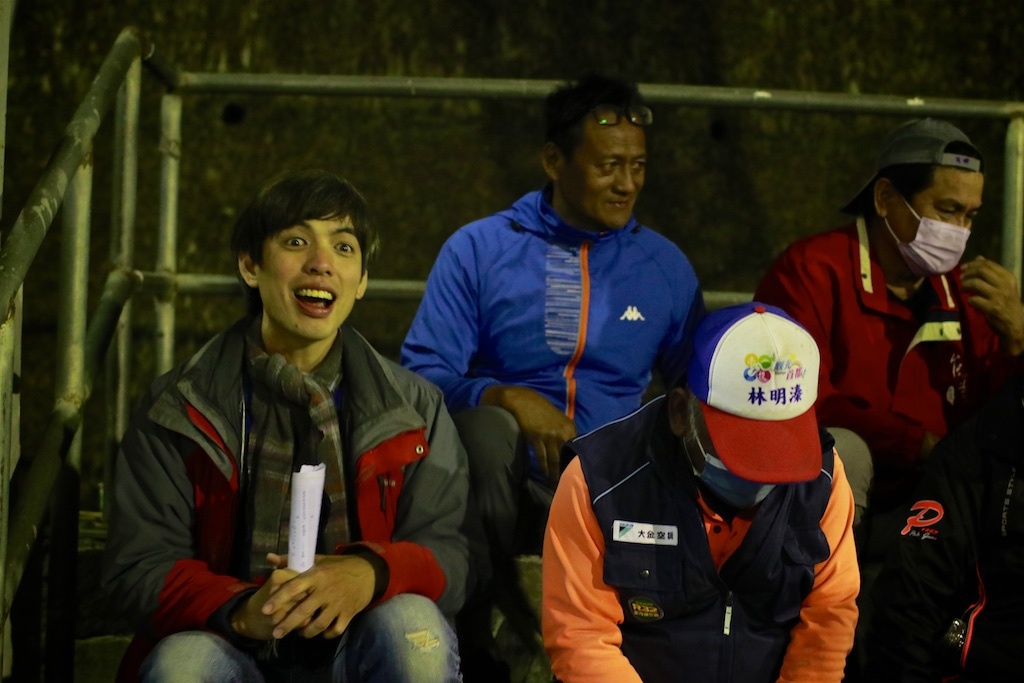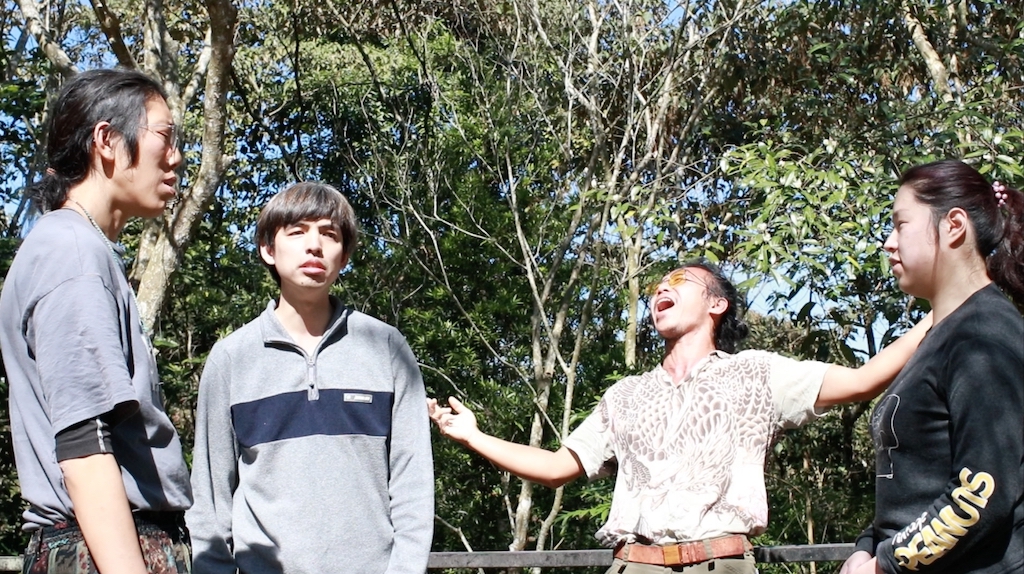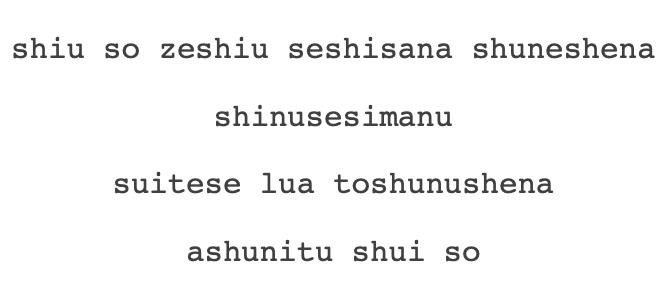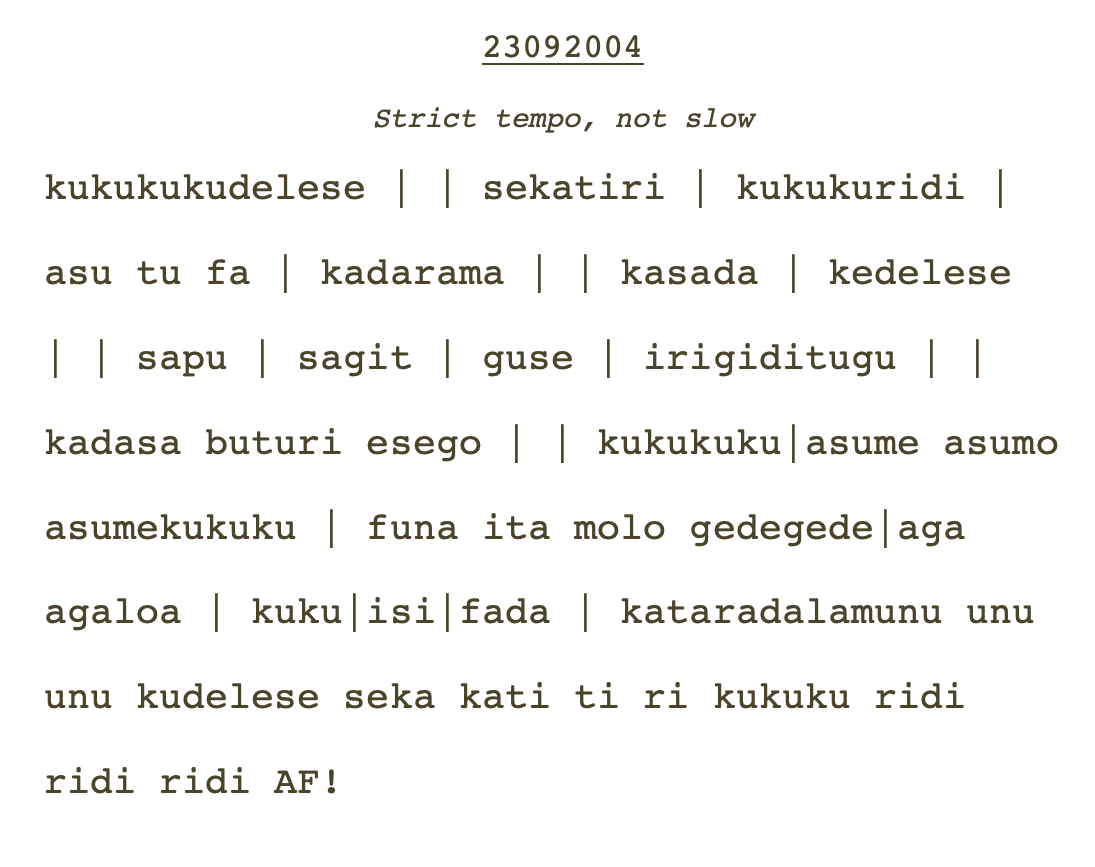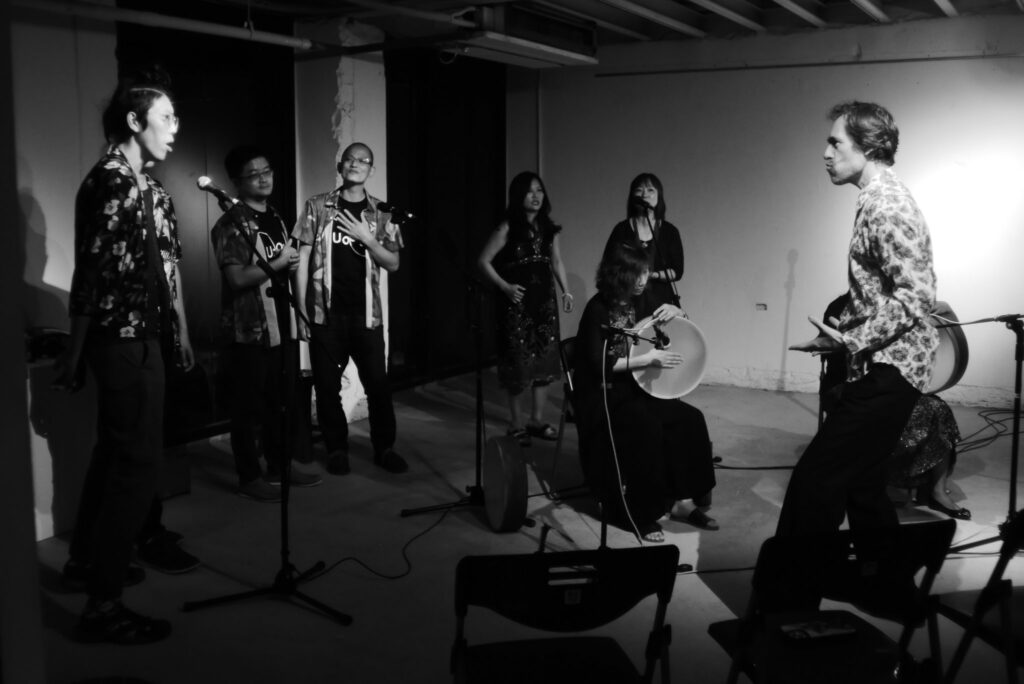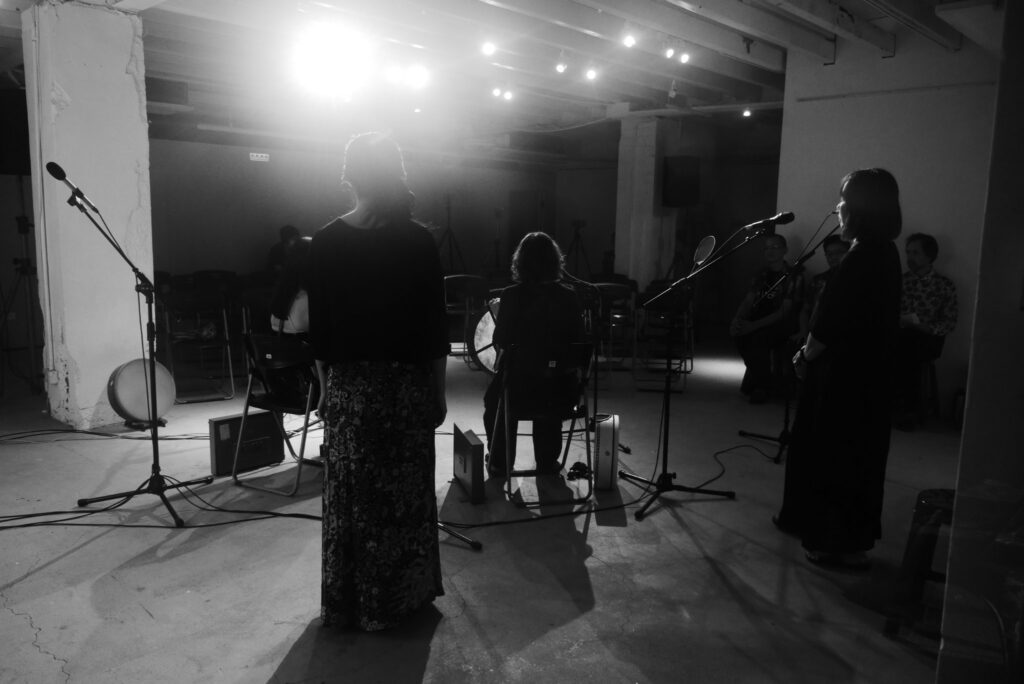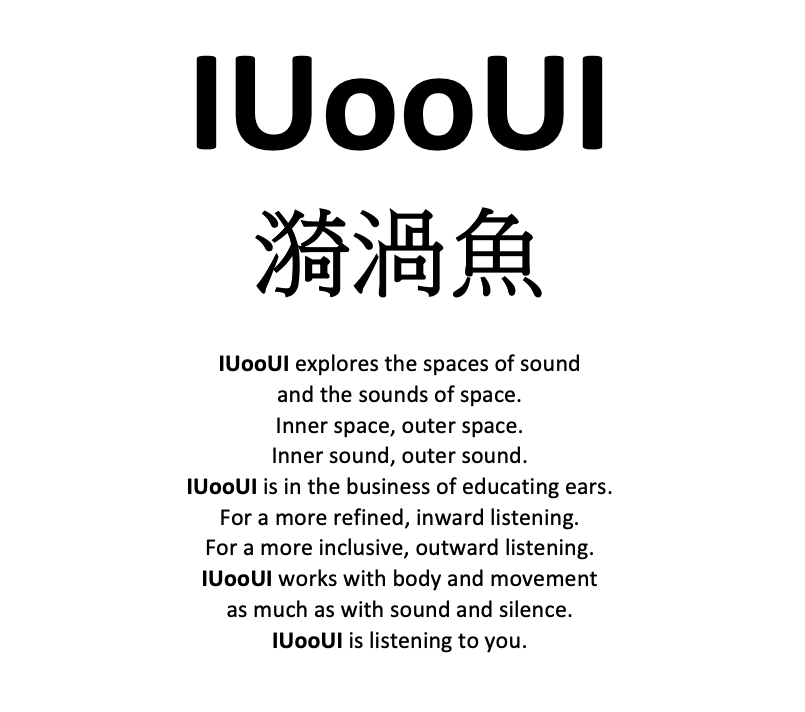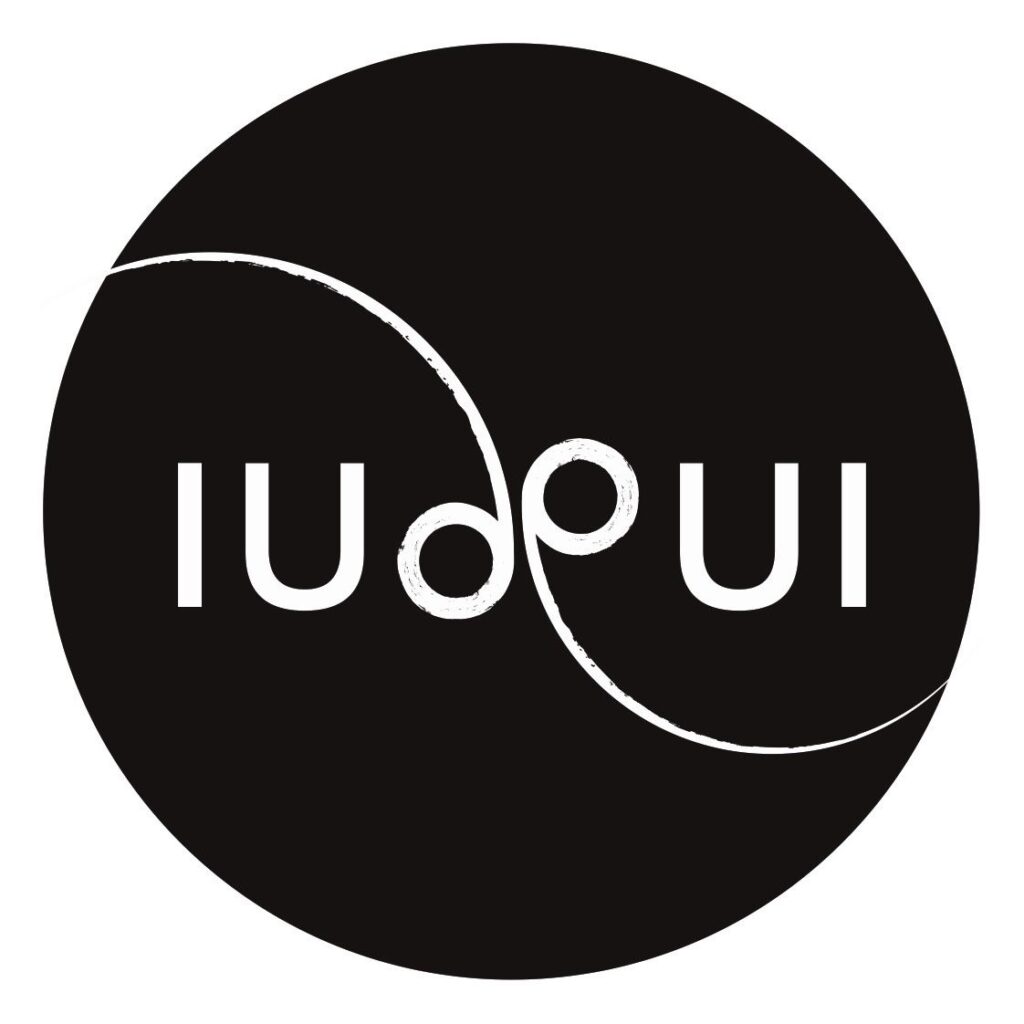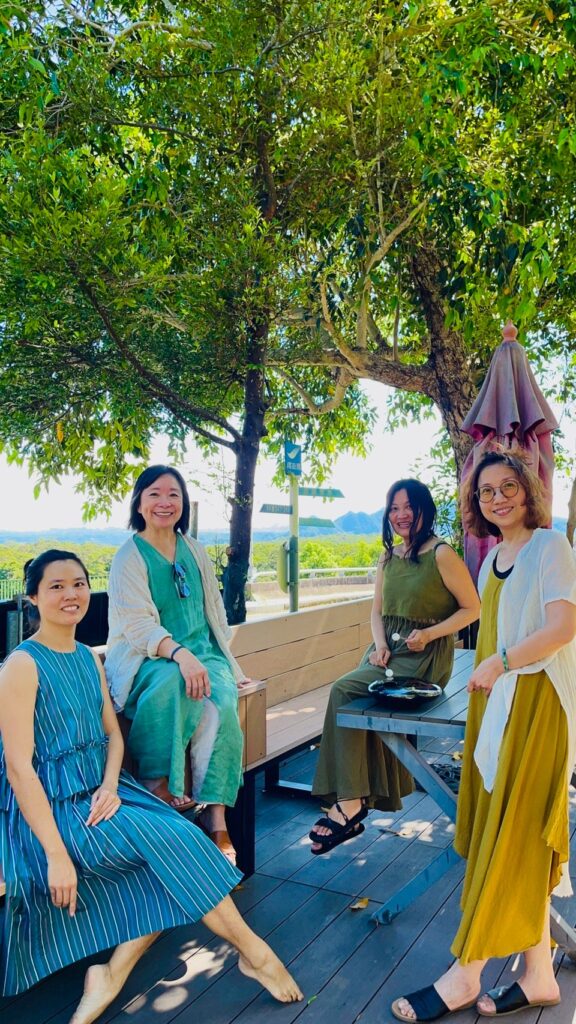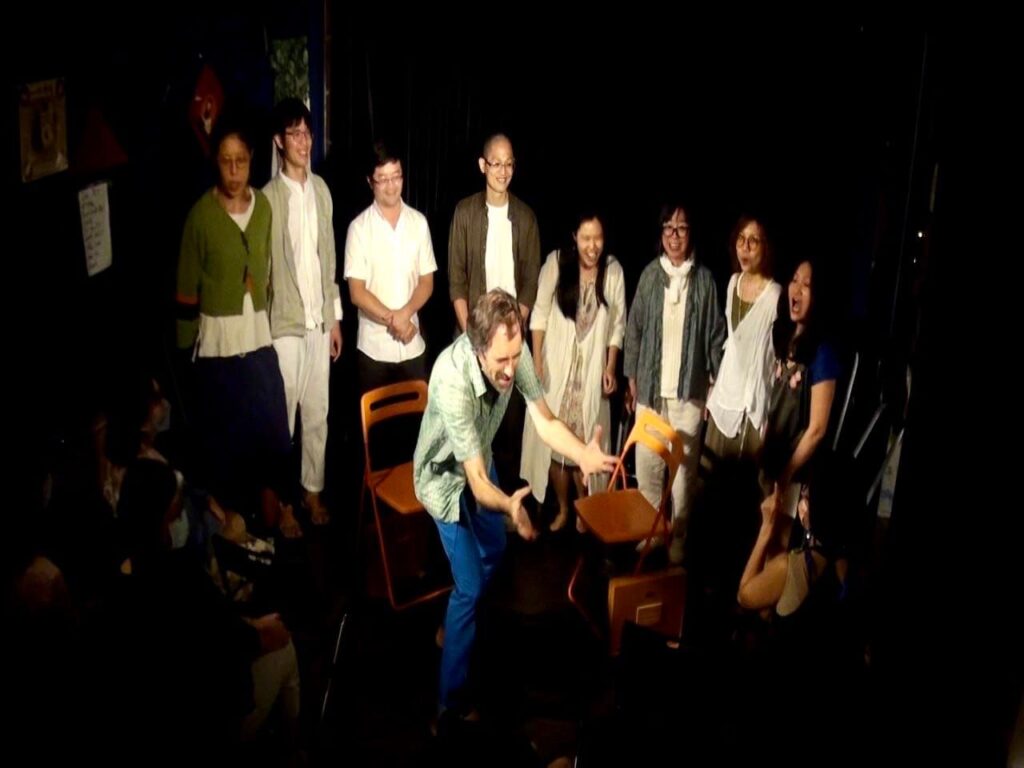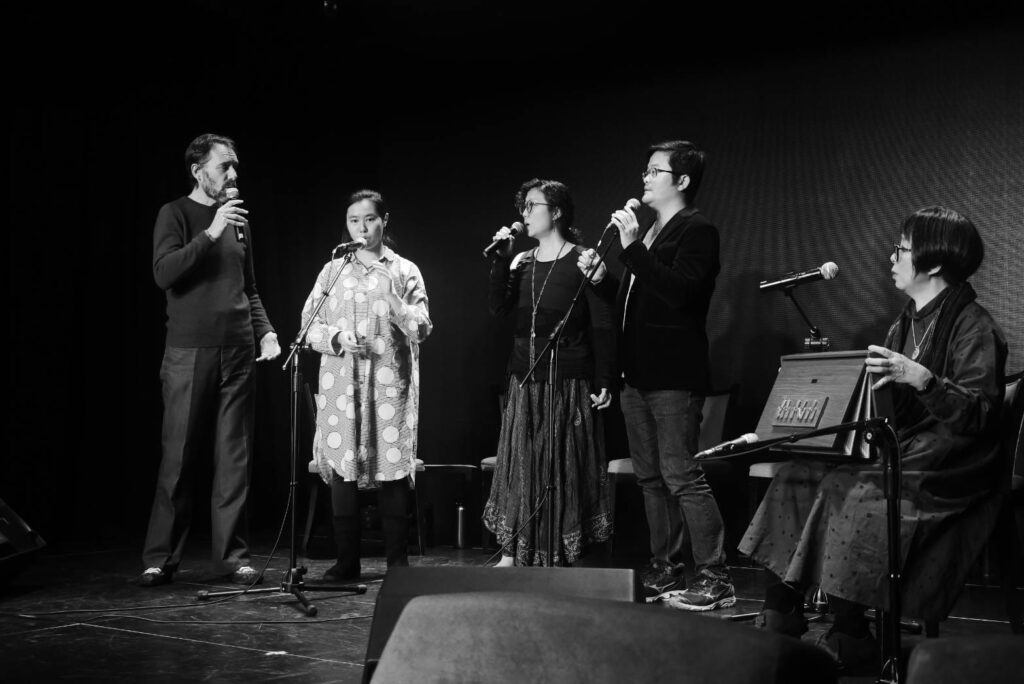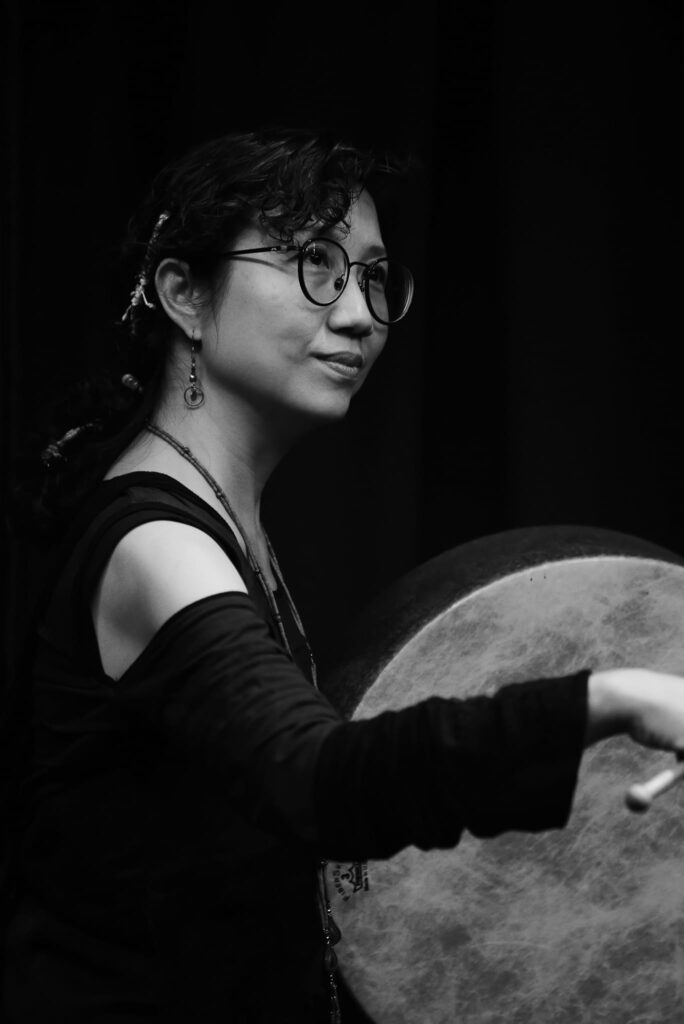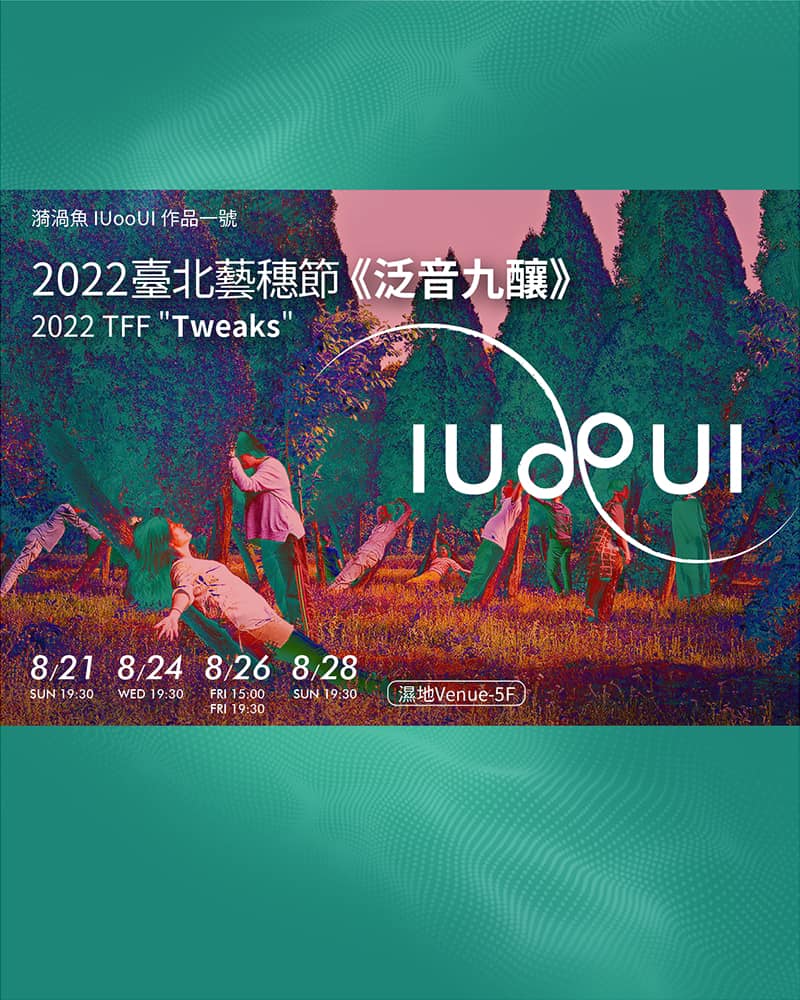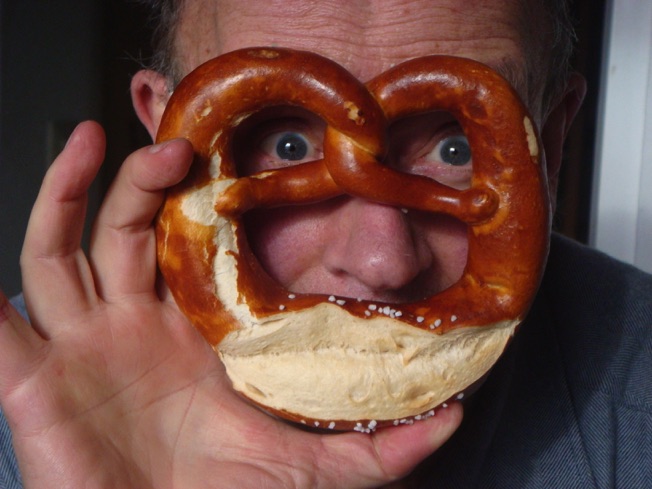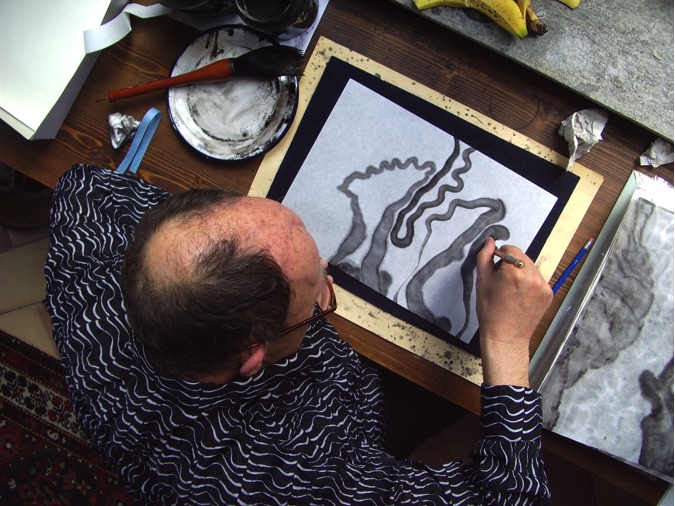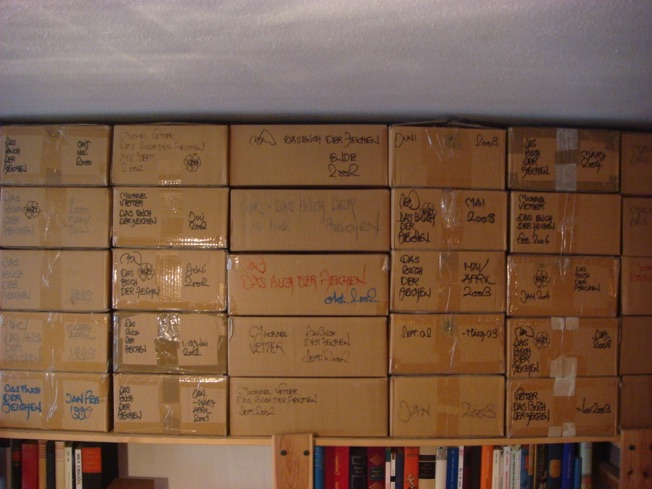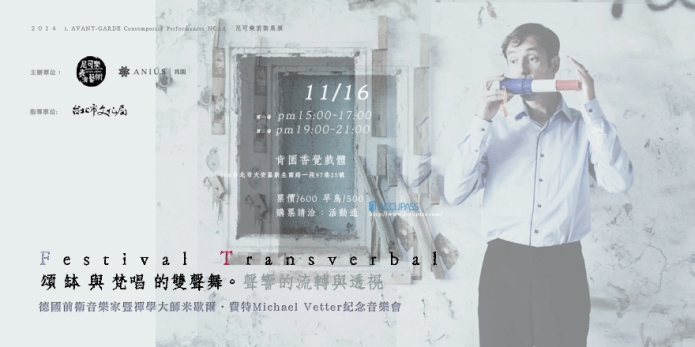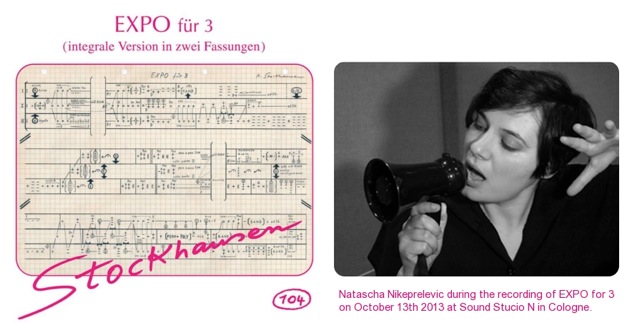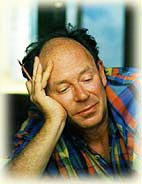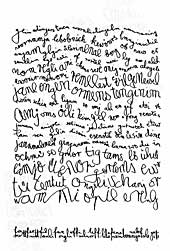(中文請見下方)
During one of my concerts in Taucha, Germany, last month, I asked the audience who knows the name Michael Vetter. Several people raised their hands. But as I expected, many people at the Ancient Trance Festival don’t know his name. Of course, quite a few more may have heard his music in the Age of Spotify: you listen but don’t know what album is playing, now that a physical relationship to the medium (as in the time of LPs, CDs) is outdated. Besides, Ancient Trance is not exactly overlapping with Vetter’s artistic direction. He was much more avant-garde, with musical influences from Baroque to Dada and Fluxus, and a host of visual influences, from mediaeval religious painting and Chinese calligraphy to comics.
In the next few weeks O TRIOM is looking back at the life and work of the instrumentalist, vocalist, painter, poet, pedagogue and ordained Zen master Michael Vetter (1943-2013). We will be showing how his legacy continues to inspire, inform and transform our performing today in several concerts, a lecture and workshops. Why? Certainly not because Vetter was such a fine overtone singer. There are and have been many fine overtone singers, and Vetter’s style of singing and performing was one of many – not ‘just’ one of many, but a very influential one, to be sure. In the 1980s, anyone wanting to do something with overtone singing went to Vetter’s workshops and bought his albums, at least in very active German-speaking areas (and The Netherlands too). Vetter set certain standards for overtone singing, for a certain period of time, and those standards hardly changed.

Michael Vetter making Indian ink drawings, Academia Caparaia, Italy, 2009. (Photograph Mark van Tongeren under protection of Creative Commons CC BY-NC-ND)
The interest of O TRIOM in Vetter also started with overtone singing, but soon branched out in many other directions. For example: Vetter as a typical Zen Buddhist. He insists again and again that one should give undivided attention to what one is doing when making music (or anything else, though he would not talk about anything, but about art). And he applied this attitude in all his music, and all his other creative work, as well as his cooking and everyday life. When I read and re-read his texts, or when I go through the conversations we had and the interviews I did with him, I frequently stumble upon contradictions (literally: ‘counter-speaking’) concerning his spiritual or religious outlook. You may be looking to clarify his positions towards spiritual questions, and find that he has much to say about that. Many people felt he was a very religious person and his biography testifies to that. Certainly a believer! But then you will sooner or later find a remark in which he warns for overzealous religious interpretations. “Here and there one learns about the connection between overtones and Our Lord. That is far removed from me!” And yet, many of his art and music works bear very clear Christian (and not just Zen) elements.
It seems that it does not make sense. And that is exactly what we can take away from Michael Vetter (or maybe from Zen in general), and what keeps me coming back to him for fresh insights: there is no single, or final way to talk about or do anything. There are only temporarily, or partially ‘true’ or ‘convincing’ arguments to believe, or positions to take. As soon as one clings too much to certain truths, it is time to let it go again and look for yet another perspective .
In the weeks to come we will prepare ourselves with this in mind: try as best as you can to follow certain aesthetic and creative paths, and be always willing to throw them overboard again and replace them with something new. I am excited about this moment in our O TRIOM collaboration, which began in early 2022, if I remember well. And I salute the brilliant artist who bridged so many visions and visuals, sounds and musics, thoughts and dreams in a lifetime bursting with creative output.
Read an earlier post about why we should remember Michael Vetter here.
PROGRAM
Lecture Transverbal
Time: 6th October (Friday) 2023, 19:00-21:30
Location: Guling Street Avant-garde Theatre, 2rd floor
Speaker: prof. CHUNG Mingder (Department of Theatre Arts, TNUA), Mark van Tongeren, LU Qi Chung, LEE Wei Lin
Workshop Michael Vetter’s Overtone Singing Methods
Time: 13th October (Friday) 2023, 10:00-17:00
Location: Guling Street Avant-garde Theatre, 3rd floor
Facilitator: LU Qi Chung, LEE Wei Lin
Workshop OKYO
Time: 17th October (Tuesday) 2023, 10:00-17:00
Location: Guling Street Avant-garde Theatre 3rd floor
Facilitator: Mark van Tongeren
REGISTER HERE FOR WORKSHOPS AND LECTURE
Overtone Singing Concert for Michael Vetter
21st October (Saturday) 2023, 19:00
22nd October (Sunday) 2023, 14:00
Location: Dreamphony Hall (No. 59, Lane 97, Guangrong Rd, Luzhou District, New Taipei City, Taiwan 247)
FOR CONCERT TICKETS
CLICK HERE
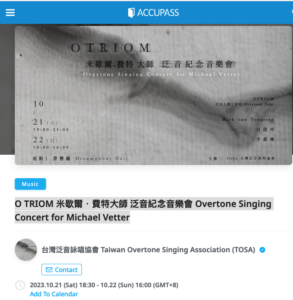
O TRIOM Artists
LEE Wei Lin
LU Qi Chung
Mark van Tongeren
Production
Organizer| Taiwan Overtone Singing Association TOSA
Executive Producer | Lee Chichen
Visual Design | Bai Chi Hao
Image source | Michael Vetter
Lecture| prof. CHUNG Mingder
Taiwan Overtone Singing Association is also on Facebook.
Photos from a 2014 concert by O TRIOM






O TRIOM 紀念米歇爾·費特大師 系列泛音講座、工作坊暨音樂會
【講座】《Transverbal穿越言語》與大師相遇
時間 2023/10/6(五) 19:00-21:30
地點 牯嶺街小劇場二樓藝文空間
講者 鍾明德教授(北藝大戲劇系)、Mark van Tongeren、呂啓仲、李維琳
與談者將說談泛音音樂在台灣發展的故事,從當年北藝大邀請國外泛音音樂家來台傳藝及演出,到《OM泛唱作為藝乘》一書的誕生,泛音藝術家米歇爾・費特大師的生平創作故事,及至往後泛音音樂在台灣生根2022年台灣泛音詠唱協會TOSA的成立。
*同場放映呂啓仲拍攝之泛音藝術家費特大師來台紀錄片《Transverbal穿越語言的相遇》。
【工作坊】「米歇爾.費特的泛音詠唱法門」
時間 2023/10/13(五) 10:00-17:00
地點 牯嶺街小劇場三樓排練場
講師 呂啓仲、李維琳
|工作坊內容|
介紹「泛音唱法」,引領學員如何唱和體驗泛音,藉由唱出和聽到泛音,踏上精神的探險之旅。
【工作坊】「大師OKYO唱誦」工作坊
時間 2023/10/17(二) 10:00-17:00
地點 牯嶺街小劇場三樓排練場
講師 Mark van Tongeren
本工作坊將概述 Michael Vetter 的創作生涯,觀察他的作品中音樂/聲音和禪宗幾個主題,以及 20 世紀 90 年代及之後歐洲對禪宗日益增長的興趣如何與費特的作品呼應,以及他如何自由地採用“okyo”並對其進行改造。並一起唱送費特的okyo以及馬克本身創作的365則向費特致敬的 okyo。
點此報名工作坊&講座
O TRIOM 米歇爾‧費特大師 紀念音樂會
時間:
2023/10/21 六 19:00
2023/10/22 日 14:00
地點:
夢響廳 Dreamphony Hall
新北市蘆洲區光榮路97巷59號
**捷運蘆洲站步行約5分鐘**
演出者:Mark van Tongeren.呂啓仲.李維琳
三位聲音表演者以跨越言語的表達探索人聲表現的邊界,以他們的人聲演唱以及器樂聲響,延展意義能夠被接收及傳達的邊界,每位聽者能以個人的想像穿越這場聲音表情與意義的互動。
人聲聲音的深深冥想,耳朵為覺察細緻的泛音而內在油然寧靜下來。
踏上一場聲音旅程,深入聲響的世界以及內在生命。人聲與物質物件的探索,不停變化的聲音風景,多層次且豐富,人聲騎乘在器樂的聲響上遨遊,深入潛出,引領聽者進入集體聽覺意識的深處。人聲的合聲搭建起一個強力的通道,彷彿直通天廳的音柱,他們聲音的通道能讓聽者通往似曾相識又聞所未聞得疆域。
OKYO詩文唱誦,極簡而留白,這是泛音音樂傳承的其一精神支脈。本演出亦是對開創性的德國藝術家、作家、教育家米歇爾·費特(Michael Vetter,1943-2013)的生平及創作致敬,他將所有作品的總體概念命名為《Transverbal》—穿越言語。
音樂會購票點此



O TRIOM 演出者
製作團隊
主辦單位| |台灣泛音詠唱協會
執行製作 | 李紀辰
視覺設計 | 白濟豪
圖片來源 | Michael Vetter
講座講者| 鍾明德教授
Read an earlier post about why we should remember Michael Vetter here.


